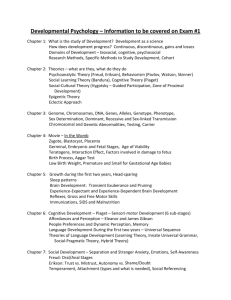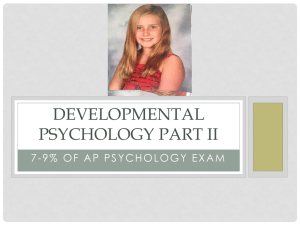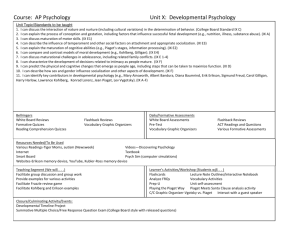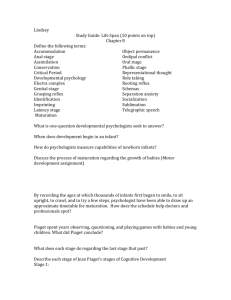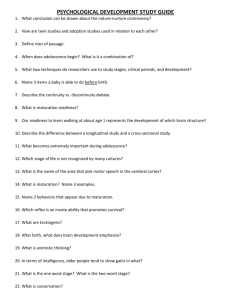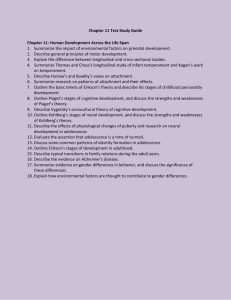College of San Mateo Course Outline
advertisement
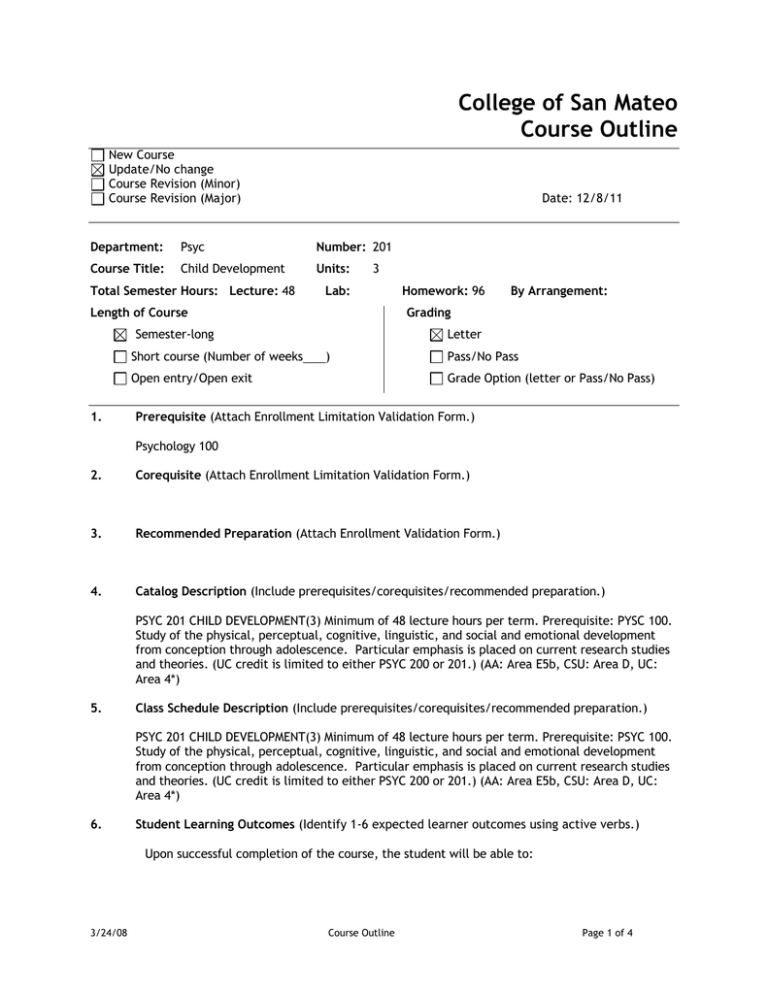
College of San Mateo Course Outline New Course Update/No change Course Revision (Minor) Course Revision (Major) Date: 12/8/11 Department: Psyc Number: 201 Course Title: Child Development Units: Total Semester Hours: Lecture: 48 3 Lab: Length of Course Letter ) Open entry/Open exit 1. By Arrangement: Grading Semester-long Short course (Number of weeks Homework: 96 Pass/No Pass Grade Option (letter or Pass/No Pass) Prerequisite (Attach Enrollment Limitation Validation Form.) Psychology 100 2. Corequisite (Attach Enrollment Limitation Validation Form.) 3. Recommended Preparation (Attach Enrollment Validation Form.) 4. Catalog Description (Include prerequisites/corequisites/recommended preparation.) PSYC 201 CHILD DEVELOPMENT(3) Minimum of 48 lecture hours per term. Prerequisite: PYSC 100. Study of the physical, perceptual, cognitive, linguistic, and social and emotional development from conception through adolescence. Particular emphasis is placed on current research studies and theories. (UC credit is limited to either PSYC 200 or 201.) (AA: Area E5b, CSU: Area D, UC: Area 4*) 5. Class Schedule Description (Include prerequisites/corequisites/recommended preparation.) PSYC 201 CHILD DEVELOPMENT(3) Minimum of 48 lecture hours per term. Prerequisite: PSYC 100. Study of the physical, perceptual, cognitive, linguistic, and social and emotional development from conception through adolescence. Particular emphasis is placed on current research studies and theories. (UC credit is limited to either PSYC 200 or 201.) (AA: Area E5b, CSU: Area D, UC: Area 4*) 6. Student Learning Outcomes (Identify 1-6 expected learner outcomes using active verbs.) Upon successful completion of the course, the student will be able to: 3/24/08 Course Outline Page 1 of 4 1. Identify and distinguish approaches to the study of human developmental psychology from conception and through adolescence. 2. Identify the strengths and challenges of using the scientific method in examining issues of developmental psychology. 3. Identify and distinguish primary models used in the study of human developmental psychology. 4. Apply human development theory and models of psychological science to analyze real world concerns. 7. Course Objectives (Identify specific teaching objectives detailing course content and activities. For some courses, the course objectives will be the same as the student learning outcomes. If this is the case, please simply indicate this in this section). Course objects are the same as SLOs. 8. Course Content (Brief but complete topical outline of the course that includes major subject areas [1-2 pages]. Should reflect all course objectives listed above. In addition, you may attach a sample course syllabus with a timeline.) Introduction to class, what is expected from students to achieve success in this class. Review definitions, operationalize terms, examine focus of examination in Psychology as it relates to development. Discuss history of ideas making up this discipline, beginning with Pre- and Enlightenment eras, and how they relate to the central concepts in each of these theories. Review theoretical perspectives with an emphasis on Darwin, Freud, Erikson, Pavlov, Skinner, and Piaget. Begin reading chapters 1-3 and completing the corresponding multiple choice questions. Introduce concept of dis- and continuous models of development, their axioms and theorems. Special attention will be spent to describe concept of critical period/sensitive period within both these models. Introduce concept of nature/nurture as they apply to these models. Review primary theory of dis- and continuous development. Apply these theories and models to the object(s) of interest in child development. Review Fundamentals of Biological development, their relationship to the concept of nature and nurture, and to the primary subject(s) of interest in child development. Emphasis will be on neural development and bilateral asymmetry and their relationship to concept of nature (genetics) and nurture (environment). Discuss Marion Diamond’s work and Harry Harlow’s work with within this context (handout). Special attention will be spent to describe and discuss environmental concerns during biological development and their relationship to social groups. Review the topic of experimental design and ethics in research. Focus on difference between cross-sectional and longitudinal design. Specific discussion will focus on the NYLS and the Spitz study, and how they relate to basic concept of naturenurture and the ideas expressed by Freud, Erikson, and Piaget, as well as Diamond/Ross/Harlow/and Sopolsky. We will finish this examination with an overview of prenatal development and a discussion of newborn baby capacities as they relate to nature-nurture. Prenatal development and newborn baby capacities. Infancy and toddlerhood. Emphasis on health care and social differences determining this care and effects on later life development. Define Cognition and its development and relationship to Psychology. Focus on relationship between habituation/dishabituation with memory and cognitive development; Piaget’s Sensory-Motor stages and their relation to cognition; and relationship between Classical and Operant conditioning with perception. Introduce traditional models of Learning: neurological, biological, and social with specific description of Pavlov and Skinner. Review experimental design and methods. 3/24/08 Course Outline Page 2 of 4 We will focus on Piaget’s SM stages and inferred concepts, the mechanics of conditioning (learning) and inferred concepts, and the neurobiology of habituation and inferred concepts. Relate and continue discussion on sensory/perceptual development in infancy to Piaget’s congnitivedevelopment theory and Information processing theory. Relate this discussion to Marion Diamon’s work and Vygtsky’s ZPD. Relate and continue discussion on sensory/perceptual development in infancy to Piaget’s congnitivedevelopment theory and Information processing theory. Relate this discussion to Marion Diamon’s work and Vygtsky’s ZPD. Discussion on Mental and Language development and relationship to consciousness, and nature/nurture. This discussion will be expanded to include issues related to Social and emotional development during infancy. Relate these topics to Freud and Erikson, Lorenz, and Harlow with reference to attachment. Special attention will be paid to Chomsky’s work in linguistics. Also, discussion on self-development and its consequences. Empasis on Piaget, Vygtsky, and Information processing perspectives of brain and motor development. Special emphasis on language and mental development during this period relative to consciousness. Compare and constrast Vygtsky and standardized teaching and testing, and project forward into social experiences. Emphasis on Erikson’s theory of events during this period, as well as on development of Moral and sexual identity. Early and Middle childhood and the school experience will be examined with special emphasis on how Piaget’s theory of language and Mind development can be integrated with memory theory and to Moral development. Discussion on psychological measurement of intelligence. Special attention to relationship between these concepts and development of self, esteem, and cognition. Emphasis on Emotional and Moral development (Erikson and Kholberg) and their relationship to basic decision making models and theories and to Piaget’s concepts of Decentering and to Freud’s concept of Ego during this period. Examine Cognitive and Motor development during Middle childhood and Adolescence with Emphasis on Piaget’s theory, especially with respect to language and abstract thought, and to emotional and Moral development during adolescence. Compare and contrast issues raised earlier with these and relate it to decisions made during adolescence, with specific emphasis on medical and social decisions. Re-introduce concept of supervision versus ego development and decentering. Early Adulthood: Biological theories of aging. Introduce Schaie, Perry and discuss the college experience as it relates to Piaget and Kholberg. 9. Representative Instructional Methods (Describe instructor-initiated teaching strategies that will assist students in meeting course objectives. Include examples of out-of-class assignments, required reading and writing assignments, and methods for teaching critical thinking skills.) If hours by arrangement are required by this course, indicate the additional instructional activity which will be provided during this time. Lecture/Discusssion. Library and online research. Textbook and workbook assignments. In class demonstration of mastery using various pen/paper techniques. 10. Representative Methods of Evaluation (Describe measurement of student progress toward course objectives. Courses with required writing component and/or problem-solving emphasis must reflect critical thinking component. If skills class, then applied skills.) Examinations and quizes to assess mastery of concepts and methods in the class. Papers and generative methods may be used to asses student mastery of course material. 3/24/08 Course Outline Page 3 of 4 11. Representative Text Materials (With few exceptions, texts need to be current. Include publication dates.) Development through the Lifespan. 4th edition, Laura Berk Prepared by: (Signature) Email address: Submission Date: 3/24/08 Course Outline Page 4 of 4

